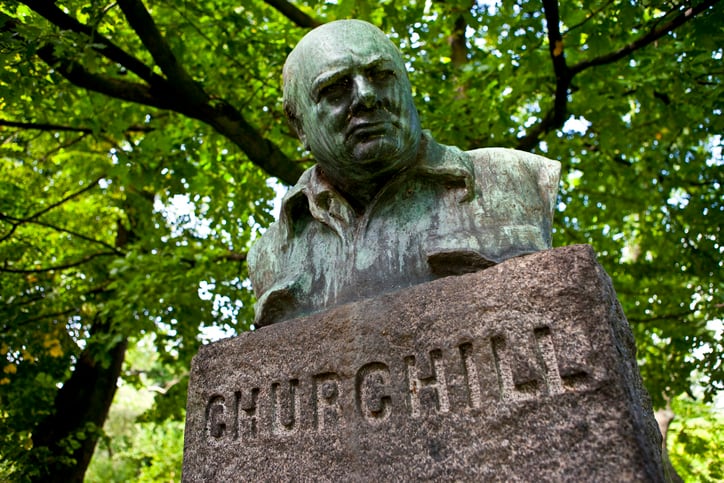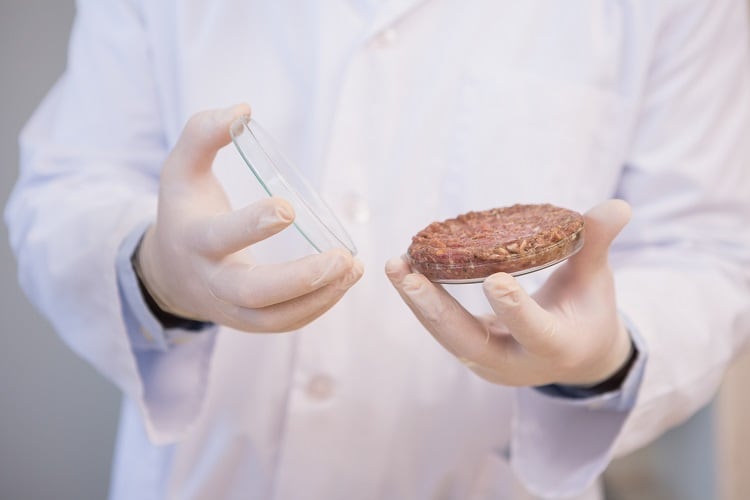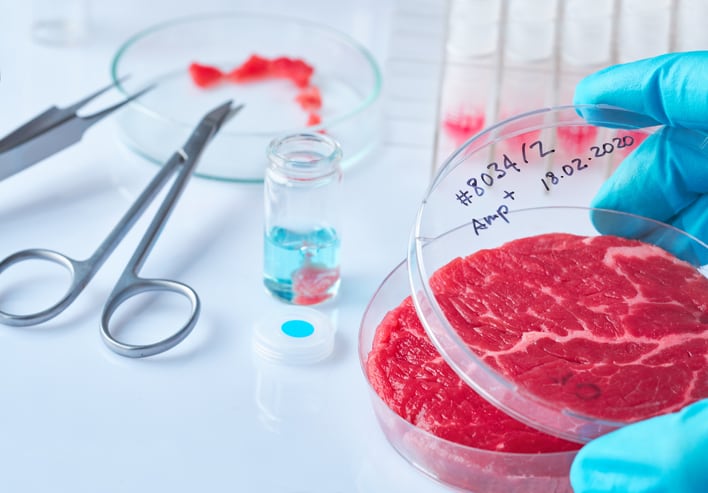You may or may not know that Winston Churchill foresaw the development of lab-grown meat. “We shall escape the absurdity of growing a whole chicken in order to eat the breast or wing,” he wrote in a 1931 essay, “by growing these parts separately under a suitable medium.” Doing so would free up land that had been used for growing crops to feed farm animals, he concluded, allowing parks and gardens to “cover our pastures and ploughed fields.”
Now, nearly 90 years on, a company is hoping to become the first British commercial cultured meat producer after creating its first test lab-made sausages given the codename ‘Churchill’ in homage to the prophetic statesman.
Ivy Farm Technologies plans to develop cultivated meat products beginning with what it calls a ‘guilt-free sausage’ for sale in supermarkets and the restaurant trade from 2023. It also plans to make beef burgers and meatballs.
The company, an Oxford University spin-out, has launched a £16 million fund-raising to build a pilot production facility in the first step towards producing 12,000 tonnes of cultured pork a year by 2025. This, it said, would be equivalent to removing 170,000 pigs from the food production chain.
Co-founder Dr Russ Tucker, whose grandparents were butchers, believes that cultured meat is not only better for the planet, but it’s better for consumers as its process doesn’t use GM techniques or antibiotics. Ivy Farm is in talks with the UK Food Standards Agency and the Government to explore ways it can support the UK’s small yet quickly emerging cultured meat sector, and says it is confident it will co-exist with progressive, traditional farming methods, offering an opportunity to re-shape the traditional UK farming system, and ensure it is ready to deal with 21st-century pressures.
These pressures include the current high costs and regulatory approval. No cell-based meat product has yet to apply for a Novel Foods Application in Europe. Singapore remains the only country in the world so far to commercialise cell-based meat products – in its case a cultivated chicken ingredient used to make nuggets.

Ivy Farm however claims to have developed what it calls a ‘unique scaffold’ system to grow cells. The start-up claims it is more efficient, faster and considerably cheaper than any other technology available anywhere in the world, which will allow it to market at scale, making it available – and affordable. The firm currently predicts its sausages when available will be around 25% more expensive than premium sausages made from outdoor reared pigs.
“We codenamed our first test sausages the ‘Churchill’ after Winston Churchill predicted the development of cultured meat nearly 90 years ago in 1931, but how they’ll be packaged and branded on shelf is something we’re currently working on,” Tucker told FoodNavigator.
“To make our sausages, we use the best components of meat – pure muscle and pure specific fats, seasoned with a blend of herbs and spices. There’s no connective tissue, or fragments of bone, or vascular tissue, or cartilage. When our development chef cooked a recent batch of sausages, they behaved in exactly the same way as conventional meat. They taste delicious too.”

How it works: extract, then proliferate
First, a small sample of muscle and fat tissue is taken from the leg of a living pig (i.e. a biopsy). The sample taken is about 1cm2 in size, small enough not to harm the animal. From the piece of tissue, the cells are then isolated for the next stage of the process, which is to proliferate (or multiply in number) the muscle and fat cells in a bioreactor.
“The bioreactors, which we use to grow the cells, are kept at 37C with what we believe is the perfect mix of nutrients, minerals and vitamins, and water,” explained the co-founder. “This is what we call the ‘culture media’. We use separate bioreactors for muscle and fat because our culture media recipes are slightly different for each.”
Within the bioreactors, the cells are attached to a surface (also known as a scaffold) which provides the right environment for the cells to grow. There needs to be enough space on the surface for the cells to proliferate into, Tucker told us. “Our ‘breakthrough’ technology is a surface, developed at the University of Oxford, that provides the ideal conditions for cells,” he said, which allows for a “continuous harvest” of the cells, without needing to stop the system. “We believe this is what makes Ivy Farm’s process cheaper, efficient and faster than other technologies on the market,” he emphasised.
The final stage is to take the cultured muscle and cultured fat from the system and combine them to make cultured meat. “By growing muscle and fat separately, we can control the ratio of fat in the end product precisely. We’ve started with pork, but the process is the same for other animals too and we are ramping up work on beef. We are developing technology to grow specific types of fats that will appeal to consumers.”
Shifting consumer attitudes
Ivy Farm said it is responding to a shift in consumer attitudes. Recent research from the company conducted in January with 1,300 UK adults found two-thirds of people said they’d be happy to try cultured meat – and more than half said they’d be willing to buy it, demonstrating what it called ‘a huge potential market in the UK.’
What’s more important to consumers: the environmental, health, or animal welfare claims associated with lab-grown meat? “We’ve done some really detailed consumer research into this,” revealed Tucker. “When we asked people who told us they are actively reducing their meat consumption why they were doing so, 53% said it was because of the environmental impact of conventional meat production. Around one in three cited other concerns including health, focusing on less and better meat, switching to meat substitutes, and concern for animal ethics.”
The green debate
But another pressure for the nascent but quickly moving cell-based meat sector is whether its claim to resolve the environmental question marks surrounding conventional meat stands up to scrutiny. There are concerns, for example, that if the electricity used in lab-grown meat production is generated from fossil fuels, the carbon footprint will be very similar to conventional meat production.
“We believe our high-quality cultured meat is not only better for animals but is better for the planet as it cuts out the need for carbon-heavy livestock farming,” responded Tucker. “One 100-gram sausage made using conventional farming methods produces 1.5 Kg of CO2. The same sausage made using cultured meat produces 0.4 Kg of CO2 – a saving of 71%.” This, and more detail on the carbon footprint of cultured versus farmed meat, he said, can be found in a CE Delft study from 2021.
He added: “Right now, we are at the development stage and our work is lab-based, but we are employing as many recycling and sustainability measures as possible. We are preparing to move to new facilities, which will make our production processes even more sustainable.
“We are fully committed to using renewable energy as we scale up our operations. Our goal is to ensure all our production plants are as sustainable as possible.”





